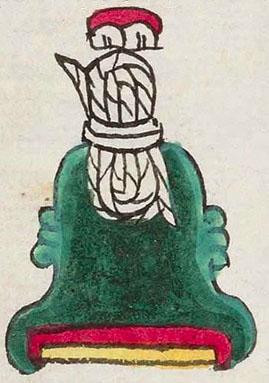Mecatepec (Mdz44r)
This compound glyph for the place name Mecatepec (an early place name for Jalieza in the state of Oaxaca, according to a presentation by Michel Oudijk in the Library of Congress, 4/18/2023) is incorrectly glossed. The gloss reads Cuatzontepec. The gloss suggests that the bundled cord (mecatl) is a skein of hair (cuatzontli), which refers to the hair on the head versus body hair, but it looks much more like bound rope. The mountain or hill is the typical bell shape, painted a two-tone green, and has the usual horizontal red and yellow stripes at the base and the curly, rocky outcroppings on both slopes. Two upper, front teeth (white with red gums) appear at the very top of this glyph, but they do not enter into the place name as given in the gloss. The locative suffix (-c) (as given in the gloss) is not shown visually, but it combines with -tepe- to form -tepec, a visual locative suffix meaning "on the hill" or "on the mountain."
Stephanie Wood
Karttunen refers to the "skein" of hair, and it does look something like a skein of yarn or string. But knowing that the real place was called Mecatepec, we can see that the bundle is a rope. The locative suffix of teeth, according to Gordon Whittaker (at the same Library of Congress workshop, 4/18/2023) serves as a phonetic indicator for "cua" (eat, bite), because the artist was trying to encourage a reading of Cuatzontepec, once again (which was not the real place name, but rather Mecatepec).
Stephanie Wood
quatzontepec puo
Cuatzontepec, pueblo (but it should be Mecatepec; and now today it is called Jalieza)
Stephanie Wood
c. 1541, but by 1553 at the latest
Stephanie Wood
One of these elements seems to be an error; the tlantli do not have a phonetic role in the place name, and the tepetl already provides a semantic indicator for the "place."
The top element is not literally part of the place name, although it could simply have the semantic meaning that this is a place. So, this glyph is read from the middle to the bottom.
mountains, hills, teeth, hair, cabello, cerros, montañas, dientes, ropes, cords, thread, yarn, nombres de lugares

meca(tl), rope, https://nahuatl.wired-humanities.org/content/mecatl
-tepec, on the hill or mountain, https://nahuatl.wired-humanities.org/content/tepec
cua, to eat or bite, https://nahuatl.wired-humanities.org/content/cua
"Hair Hill" [Frances Karttunen, unpublished manuscript, used here with her permission.]
"On the Hill of Much Hair" (Berdan and Anawalt, 1992, vol. 1, 200)
Codex Mendoza, folio 44 recto, https://digital.bodleian.ox.ac.uk/objects/2fea788e-2aa2-4f08-b6d9-648c00..., image 98 of 188.
The Bodleian Libraries, University of Oxford, hold the original manuscript, the MS. Arch. Selden. A. 1. This image is published here under the UK Creative Commons, “Attribution-NonCommercial-ShareAlike 3.0 License” (CC-BY-NC-SA 3.0).







